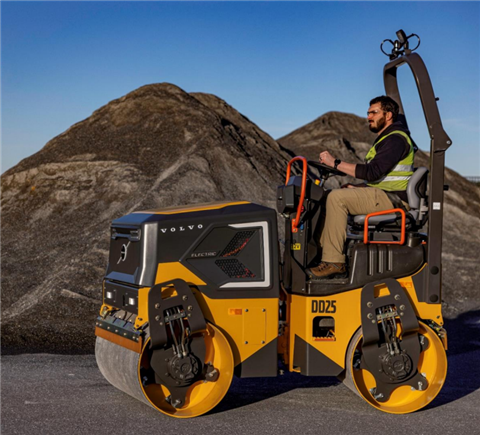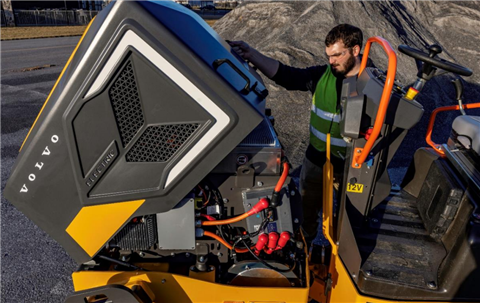Volvo CE debuts its first electric compactor
18 January 2023
 Volvo CE’s new DD25 electric asphalt compactor
Volvo CE’s new DD25 electric asphalt compactor
Set to debut at ConExpo-Con/Agg 2023, the DD25 Electric asphalt compactor is Volvo CE’s first electric machine produced specifically for the company’s road segment.
Volvo CE designed the compact double-drum compactor for small-scale compaction projects including street repairs and patching, parking lots, driveways, municipalities and rental houses.
Dr. Ray Gallant, vice president of Product Management and Productivity at Region Americas, Volvo CE, said that after the DD25 Electric’s introduction at ConExpo, the company expects to take orders for the compactor later in 2023, with deliveries in the first quarter of 2024.
The machine will initially be available in North America, with other markets to follow at a later date.
Volvo CE said the DD25 Electric is an important milestone in the manufacturer’s ambition to reach net-zero value chain greenhouse gas emissions by 2040 and is part of Volvo Group’s target to have at least 35% of its total range of vehicles fully electric by 2030.
“As a global leader in construction solutions, delivering premium products and services, we not only have a responsibility to reduce our carbon footprint, but [also] we are committed to leading the way and providing real-life solutions for our customers that will help them meet their own sustainability goals,” Gallant said. “We are proud to expand our portfolio of electric machines and extend our offering to the road segment.”
Based on the design and components of Volvo CE’s ECR25 Electric compact excavator and L25 Electric compact wheel loader — which were the first electric machines available to the construction market in 2020, according to the company — the DD25’s Electric driveline makes it ideal for urban environments with strict emission regulations and for organizations looking to meet their own sustainability goals, Volvo said.
 Volvo CE’s DD25
Volvo CE’s DD25
The DD25 Electric incorporates LED lighting, a full-color operator display, an onboard ac charging port which enables charging to 100% in as little as three hours, and a 48 V remote dc fast charger that Volvo CE said can fully charge the battery in a little over an hour.
The machine’s runtime is a full typical working shift, depending on the type of job and intensity of the work cycle, the company said.
The DD25 Electric offers 24 kW of available power, 30% more than the conventional Volvo DD25B. The manufacturer said the result is a more responsive machine in terms of speed and vibrations.
The electric machine performs better on grade, thanks to the size of its components, and better at high elevations, when compared to a diesel machine that loses power as it increases altitude, Volvo CE said.
Equipped with 360° visibility and high-frequency compaction, the DD25 Electric allows operators to achieve a smooth finish asphalt surface with speed, and the frequency can be adjusted from 3500 vpm at 55 Hz to 4000 vpm at 67 Hz to accomodate different applications, Volvo CE said.
“[The DD25 Electric] is productive, sustainable and offers good [total cost of ownership],” Gallant said. “It’s about making the whole site better, more efficient and more productive.”
STAY CONNECTED




Receive the information you need when you need it through our world-leading magazines, newsletters and daily briefings.
POWER SOURCING GUIDE
The trusted reference and buyer’s guide for 83 years
The original “desktop search engine,” guiding nearly 10,000 users in more than 90 countries it is the primary reference for specifications and details on all the components that go into engine systems.
Visit Now
CONNECT WITH THE TEAM










